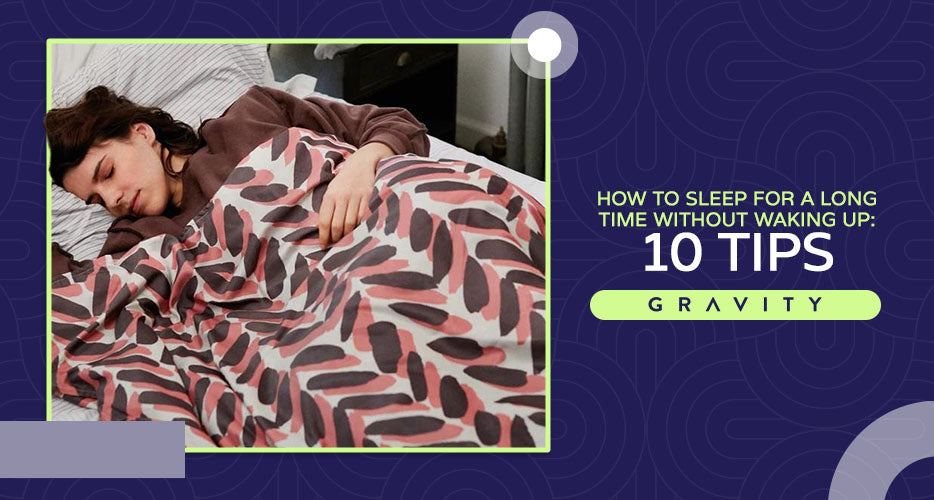
Jan 26, 2023
How to Sleep for a Long Time Without Waking Up: 10 Tips

Getting enough quality sleep at night is essential for our overall health and well-being. Sleep helps to restore energy, replenish hormones and regulate moods. But, unfortunately, many of us find it challenging to get the right amount of sleep without waking up too soon or not feeling rested in the morning. In this article, we’ll talk about why people struggle with long sleep without interruption and 10 tips on how to get a restful night’s sleep without waking up too soon.
Reasons Why You Can’t Stay Asleep Without Waking Up
Experiencing difficulties staying asleep can be frustrating and exhausting. Knowing the potential causes of your sleeping issues is important to find a solution. There are various reasons you cannot stay asleep, so let’s look into some common culprits.

Uncomfortable Bed or Sleeping Environment
Uncomfortable beds or sleeping environments may keep you from getting a good night’s rest without interruption. From an uncomfortable mattress or pillow to too much light in the bedroom to noise from traffic, temperature fluctuations and more, these seemingly small factors can make it hard to relax and fall asleep for an extended period without waking up. Creating the perfect atmosphere for sleep is essential for getting the quality snooze you need.
Stress and Anxiety
Stress and anxiety can also significantly contribute to difficulty sleeping without waking up. When worries and fears build up in your mind, it’s hard to achieve the kind of relaxation you need for deep, restorative sleep. Even if you aren’t consciously aware of it, stress and anxiety can manifest themselves in physical ways. For example, your body may tense up more than usual, you could experience a racing heartbeat or tightness in your chest and you may feel overwhelmed with emotions. This physical reaction to mental distress can make it difficult for your body and mind to relax enough for a deeper sleep.
Unhealthy Diet and Alcohol Consumption
An unhealthy diet and alcohol consumption can also contribute to sleep disturbances. Eating foods high in sugar and caffeine or drinking too much alcohol can make falling asleep harder and disrupt your deep restorative sleep cycles. Additionally, unhealthy eating habits may cause digestive issues that manifest as physical discomfort, making it difficult to achieve a comfortable position for sleeping.
Disordered Sleep Patterns and Sleeping Aids
Establishing regular and healthy sleep patterns is key to achieving restful sleep. However, disordered sleeping patterns can make it difficult to regulate your body to be able to sleep and wake at consistent times. These can be caused by inconsistent sleep schedules, napping outside your routine and relying on sleeping aids like alcohol or medication to help you get to sleep. This can complicate attempts to get your body back into a healthy sleep-wake rhythm.
Medical Conditions and Aging
Certain medical conditions, like depression and chronic pain, can make sleep seem impossible. Also, getting a good night’s rest may become more difficult as we age. Changes in our ability to fall asleep easily or stay asleep for extended periods can be caused by hormonal imbalances related to aging.
Get Your Sleep Mask Now for a Refreshing Night’s RestTips for a Long, Restful Sleep Without Waking Up Too Soon
Everyone deserves a good night’s sleep, but sometimes it can seem difficult to achieve. If you’re feeling sluggish during the day because of too many early wake-ups, these tips can help you get the restful and long sleep you need.

1) Have a Proper Bedtime Routine
A proper bedtime routine is essential to ensure a good night’s sleep. It involves creating consistent habits around going to bed that prepares your body and mind for rest. This could include things like:
- Adhering to a consistent schedule
- Taking time to unwind by listening to calming music, reading a book or stretching
- Taking a warm bath or shower
- Using a weighted robe to help relax muscles and release tension
- Using essential oils or scents like lavender and chamomile for relaxation
The goal is to engage in calming activities before lying down so your body and mind can feel relaxed enough for deep, restorative sleep.
2) Make Your Bedroom a No-Work Zone
Many of us work part-time from home or entirely remote, which means finding a way to separate work life and home life can be difficult. Making sure your bedroom is a no-work zone will help you unwind and relax after a long day, making sleep come more naturally.
It may be tempting to squeeze a small workstation into your primary bedroom, but it can also cause stress and make it harder to disconnect from work at night. Also, if you forget to turn off notifications on your laptop, it could cause disruptions and wake you up unexpectedly. Instead, you’re better off setting up a separate office space for work so that it’s only relaxation when you’re in your bedroom.

3) Reduce Screen Time Before Bed
According to research studies on athletes, the blue light emitted from electronic devices such as smartphones, tablets and laptops has been found to have adverse effects on sleep quality and duration. And if it affects athletes, it’s likely to affect all of us. Therefore, reducing screen time before bed is recommended to ensure more restful sleep and better overall well-being. This means turning off all screens at least an hour before bed so that your body has enough time to wind down without the distraction or stimulation of electronics or bright lights.
Additionally, make sure any electronic devices you cannot turn off or must use are set to night mode, which will filter out the blue light and give you a better chance of having a successful sleep.
4) Avoid Caffeine After 4 P.M.
To ensure your body has enough time to wind down and achieve restful sleep, avoiding consuming caffeine after 4 o’clock in the afternoon is best. Caffeine has a half-life of about five hours, so drinking coffee at five or six in the evening means there will still be a considerable amount of caffeine in your system at bedtime, which can disrupt your sleep. In addition to coffee, caffeine can also be found in products such as soft drinks, energy drinks, certain teas and chocolate bars.
5) Block Out Sound and Light
Blocking out sound and light to create a dark, quiet environment is one of the best ways to get a restful sleep. Light and sound influence our sleep cycles and can cause us to wake up at night. A prime example of this is street noise or bright lights from outside that can easily wake someone up. By blocking out these distractions with blackout curtains and eye masks, you can control the atmosphere in your bedroom more effectively.
These items provide comfort while helping people stay asleep longer without being disturbed. Sleep masks are especially beneficial since they provide complete darkness even if light enters the room, creating an environment perfect for falling asleep quickly and deeply.
6) Maintain an Optimal Sleep Environment Temperature
Not only is it important to create a dark and quiet environment for optimal sleep, but maintaining an ideal temperature is just as vital. According to the Sleep Foundation, the best ambient bedroom temperature is around 65 degrees Fahrenheit (or 18 degrees Celsius). It would help to consider how your body temperature adjusts while sleeping. Too hot, and you may wake up throughout the night due to heat and sweating. But if it is too cold, you might shiver awake, disrupting your sleep.
Thankfully, there are ways to regulate overall temperatures by using the right bedding. A cooling weighted blanket can help drop the temperature a few degrees if you’re usually too warm at night. If too cold, try using a weighted blanket cover for extra coziness and insulation. This will add some comforting warmth without compromising quality rest.
Beat the Heat with a Cooling Weighted Blanket7) Exercise Regularly But Not Too Close to Bedtime
Regular exercise is key to getting restful sleep. Still, it’s important not to exercise too close to bedtime since this can make it harder to drift off. The best time to exercise is in the morning or early afternoon. This way, your body can wind down and relax before bed. Exercise helps reduce stress levels, expend energy, increase endorphins and regulate your sleep-wake cycle.
Not only will regular exercise increase your energy throughout the day, but it can also help you have better quality sleep at night. Finding an activity that works for you and fits into your schedule is important. So if you’re not a fan of running, don’t force yourself to do it. There are plenty of other forms of exercise available. Whether it’s swimming, Pilates or cycling, find something that works for you and stick with it.
8) Stick to Healthy Eating Habits
Eating too close to bedtime can affect digestion and disrupt sleep. Eating heavy meals late at night can cause indigestion, leading to discomfort and restlessness while trying to doze off. Some foods are also high in stimulants like sugar and caffeine, which can keep you up longer or result in less restful sleep.
On the other hand, eating healthy food promotes steady energy levels throughout the day. As a result, it helps establish better sleep cycles at night. Choose nutrient-rich snacks low in calories and high in vitamins, minerals, fiber and antioxidants, like fruits, nuts, seeds, yogurt and granola bars. Eating these foods during the day will boost energy without leaving you feeling too full or overstimulated before bedtime.

9) Use a Weighted Blanket
Weighted blankets are becoming increasingly popular for their potential benefits to adults and children regarding restful sleep. These blankets use the principles of pressure therapy, which has been used for decades in occupational therapy. Weighted blankets are filled with fine plastic or glass beads that provide gentle, even pressure across the body as you lie down. This helps relax the muscles, calm the nervous system and reduce symptoms such as insomnia, stress and anxiety. This calming effect can lead to less frequent wake-ups throughout the night so you can get a full night’s rest without interruption.
10) Address Medical Concerns and Issues
Lastly, it is important to address mental and physical health when achieving a good night’s sleep. Mental health issues like anxiety disorders or depression can cause difficulty falling asleep or staying asleep. At the same time, physical ailments like bad backs can be painful and distracting during the night. Specific side effects of medications can also disrupt sleep, so make sure to speak with your doctor about any potential risks. The best way to address sleep-related concerns is by seeking help from a medical professional who can diagnose the issue and recommend solutions. Working with a healthcare provider will enable you to find the most effective solution for maximizing sleep quality.
Final Thoughts on Better Continuous Sleep
Overall, good sleep hygiene is essential for feeling rested and energized. If you’re having trouble sleeping, there are several things you can do to improve your sleep quality, including sticking to healthy eating habits, addressing medical issues and concerns with a professional, avoiding stimulants like caffeine and sugar in the evening and creating a comfortable sleep environment. These steps will help ensure you get enough rest to wake up feeling refreshed and ready to tackle the day ahead. With proper sleep hygiene and the right lifestyle practices, anyone can achieve the benefits of a good night’s sleep.
Image Credits
Strawberry Blossom/Shutterstock.com
RNDSGN STUDIO/Shutterstock.com
Your use of this website, its content, and any products obtained through this website is at your own risk. This website, its content, and any products obtained through this website are provided on an “as is” basis, without any warranties of any kind, either express or implied, including warranties of merchantability, infringement of intellectual property, or fitness for any particular purposes. No warranty or representation is made with respect to the completeness, reliability, quality, or accuracy of this website or its content. This website, its content, and any products obtained through this website do not constitute medical treatment and is not a substitute for a medical examination or diagnosis. If you are dealing with a health condition check with your health care provider before using. This website may contain affiliate links that allow us to earn a commission on purchases made through such links. We may accept forms of advertising or sponsorships in connection with this website. There might also be paid topic insertions. We may accept and keep free products, services, and other forms of compensation from others.



